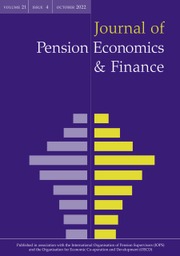Crossref Citations
This article has been cited by the following publications. This list is generated based on data provided by
Crossref.
Alessie, Rob J.M.
Angelini, Viola
and
van Santen, Peter
2011.
Pension Wealth and Household Saving in Europe: Evidence from SHARELIFE.
SSRN Electronic Journal,
Agnew, Julie
Bateman, Hazel
and
Thorp, Susan
2012.
Financial Literacy and Retirement Planning in Australian.
SSRN Electronic Journal,
Clark, Gordon L.
2012.
Mapping Financial Literacy: Cognition and the Environment.
SSRN Electronic Journal,
Clark, Gordon L.
2013.
Mapping financial literacy: cognition and the environment.
Geografiska Annaler: Series B, Human Geography,
Vol. 95,
Issue. 2,
p.
131.
Alessie, Rob
Angelini, Viola
and
van Santen, Peter
2013.
Pension wealth and household savings in Europe: Evidence from SHARELIFE.
European Economic Review,
Vol. 63,
Issue. ,
p.
308.
2013.
Global Financial Development Report 2014: Financial Inclusion.
p.
151.
Potrich, Ani Caroline Grigion
Vieira, Kelmara Mendes
and
Ceretta, Paulo Sergio
2013.
Nível de alfabetização financeira dos estudantes universitários: afinal, o que é relevante?.
Revista Eletrônica de Ciência Administrativa,
Vol. 12,
Issue. 3,
p.
315.
Alessie, Rob J.M.
Angelini, Viola
and
van Santen, Peter
2013.
Pension Wealth and Household Savings in Europe: Evidence from Sharelife.
SSRN Electronic Journal,
Klapper, Leora
Lusardi, Annamaria
and
Panos, Georgios A.
2013.
Financial literacy and its consequences: Evidence from Russia during the financial crisis.
Journal of Banking & Finance,
Vol. 37,
Issue. 10,
p.
3904.
Lusardi, Annamaria
and
Mitchell, Olivia S.
2013.
The Economic Importance of Financial Literacy: Theory and Evidence.
SSRN Electronic Journal,
Lusardi, Annamaria
and
Mitchell, Olivia S.
2013.
The Economic Importance of Financial Literacy: Theory and Evidence.
SSRN Electronic Journal,
Bucher-Koenen, Tabea
Lusardi, Annamaria
Alessie, Rob J.M.
and
<!>van Rooij, Maarten
2014.
How Financially Literate Are Women? An Overview and New Insights.
SSRN Electronic Journal,
Clark, Gordon L.
2014.
Roepke Lecture in Economic Geography—Financial Literacy in Context.
Economic Geography,
Vol. 90,
Issue. 1,
p.
1.
Lusardi, Annamaria
2014.
Financial Literacy: Do People Know the ABCs of Finance?.
SSRN Electronic Journal,
Lusardi, Annamaria
and
Mitchell, Olivia S.
2014.
The Economic Importance of Financial Literacy: Theory and Evidence.
Journal of Economic Literature,
Vol. 52,
Issue. 1,
p.
5.
Brown, Martin
and
Stix, Helmut
2015.
The euroization of bank deposits in Eastern Europe.
Economic Policy,
Vol. 30,
Issue. 81,
p.
95.
Agarwal, Sumit
Amromin, Gene
Ben-David, Itzhak
Chomsisengphet, Souphala
and
Evanoff, Douglas D.
2015.
Financial literacy and financial planning: Evidence from India.
Journal of Housing Economics,
Vol. 27,
Issue. ,
p.
4.
Reyers, Michelle
van Schalkwyk, Cornelis Hendrik
and
Gouws, Daniël Gerhardus
2015.
Rational and behavioural predictors of pre-retirement cash-outs.
Journal of Economic Psychology,
Vol. 47,
Issue. ,
p.
23.
Mancebon, Maria Jesss
Ximmnez-de-Embbn, Domingo P.
and
GGmez-Sancho, Joss Marra
2015.
What Determines the Financial Literacy of Young People? An Analysis from PISA 2012.
SSRN Electronic Journal,
Kristjanpoller, Werner D.
and
Olson, Josephine E.
2015.
Choice of Retirement Funds in Chile: Are Chilean Women More Risk Averse than Men?.
Sex Roles,
Vol. 72,
Issue. 1-2,
p.
50.




